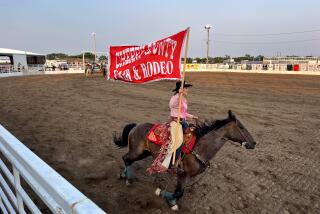War Wears on Voters in Key Minnesota Suburbs
COON RAPIDS, Minn. — The wrinkles in Pearl Dick’s 81-year-old face folded into a grimace of anger and disappointment as she scolded President Bush.
“I voted for him, but damn it, I’m not happy with what he’s done” in Iraq, she said after noontime macaroni at a diner in this Minneapolis suburb. “You know, let them fight their own battles, for chrissakes. Why should we go over there and do it?”
For the record:
12:00 a.m. April 17, 2004 For The Record
Los Angeles Times Saturday April 17, 2004 Home Edition Main News Part A Page 2 National Desk 1 inches; 57 words Type of Material: Correction
Presidential votes -- An article in Friday’s Section A on voter reaction in Minnesota to the rising violence in Iraq said that in past presidential elections, Richard Nixon carried the state three times, Gerald Ford once and Ronald Reagan twice. Those results were for Iowa. Nixon won Minnesota once, in 1972. Neither Ford nor Reagan carried Minnesota.
The gravel-voiced retiree said the killing of U.S. troops was “making me sick.” So after years of voting mostly Republican, she was leaning against backing Bush this year. “That’s what’s really been hurting me: Every day, it’s a Marine, and it’s from around here.”
In Coon Rapids and other suburbs of Minneapolis and its twin city, St. Paul, the political damage that Bush has suffered because of the upsurge of violence in Iraq is unmistakable.
If those qualms persist, it could pose a significant threat to Bush’s reelection hopes. Voters in these suburbs have become the key to carrying Minnesota, one of the closely contested states in the 2004 presidential race. And their views are apt to reflect those in similar communities that could be decisive in other crucial states.
“I would certainly expect what you’re seeing in Minnesota to be mirrored in the suburbs of Chicago or Cleveland or Detroit or Philadelphia or Milwaukee,” said Rhodes Cook, an election analyst who publishes a nonpartisan Washington newsletter on national voting trends.
Whoever wins those suburbs “is very likely to win the White House as well,” he said. “It’s critical.”
In 2000, Democrat Al Gore defeated Bush in Minnesota by a surprisingly close 2.4%; Bush lost just four states by a narrower margin. So this year, both parties have made this vast state on the Canadian border -- with its prize of 10 electoral votes -- a top target.
Bush is heavily favored in rural Minnesota, apart from mining areas where organized labor is strong. His presumed Democratic rival, Sen. John F. Kerry of Massachusetts, should get strong support in the urban core of the twin cities.
That makes political battlegrounds out of quiet suburbs like Anoka, just up the Mississippi River from Coon Rapids. And there, where a blast of warm air this week swept away the fierce northern winter, Iraq is very much on the minds of voters such as Beverly McDonald, 74, a retired bank mailroom supervisor.
“I don’t think we really should have gone in there in the first place,” she said on a walk to the bank to fetch coins to do laundry.
McDonald voted for Bush in 2000 but opposes his reelection, mainly because of the war. What bothered her most, she said, was his premise for invading Iraq -- the allegations that former Iraqi President Saddam Hussein harbored weapons of mass destruction.
“I just don’t think [Bush] has been honest with the public about it,” she said as she walked on Main Street in Anoka, best known as the place where “A Prairie Home Companion” radio host Garrison Keillor grew up.
Despite such misgivings, many others interviewed this week in the Minneapolis suburbs remain firmly behind Bush on Iraq.
William Schwandt, 35, a South St. Paul behavior analyst for autistic children, voted for Gore in 2000 but said Bush was “doing what he needs to do,” given the “Hitleresque” nature of Hussein’s regime. As a result, Schwandt said, Bush could still win his support in November.
For both parties, Minnesota is rich with potential; its voters are among the most independent-minded in the country. They list no political party when they register to vote.
Nationally, they are known for sending Democrats to the U.S. Senate, among them Hubert H. Humphrey, Eugene McCarthy, Walter F. Mondale and Paul Wellstone. But they stunned the country by electing wrestler Jesse Ventura, a Reform Party candidate, as governor in 1998.
They also lean regularly toward Republicans, choosing Richard Nixon (three times), Gerald Ford (once) and Ronald Reagan (twice) for president. In 2002, they elected Republicans Tim Pawlenty and Norm Coleman to replace Ventura and Wellstone, respectively, and the GOP picked up seats in the state Legislature.
Good showings in the twin cities’ suburbs were essential to the GOP victories two years ago. Still, analysts attribute the Republican surge more to stumbles by Democrats than to any shift in voter ideology.
“It may be the most inept Democratic Party in the northern half of the country,” said Lawrence Jacobs, a University of Minnesota political science professor. “It’s really poorly organized, makes a lot of bad decisions.”
In late January, a poll by the St. Paul Pioneer Press and Minnesota Public Radio found Bush and Kerry running roughly even. But since then, national security issues -- long seen as Bush’s ace in the election -- have posed new troubles for the president.
In Minnesota and elsewhere, concerns about Bush’s policies have grown as the situation in Iraq has worsened. A Newsweek poll last week found 51% of Americans disapproved of Bush’s handling of Iraq. The survey also reported that public approval of his anti-terrorism efforts had dropped to 59% from 70% earlier this year.
Minnesota has lost eight troops in Iraq, three of them in the last two weeks. The local news carried stories this week of sobbing, white-gloved Marines carrying the casket of a 22-year-old comrade, Tyler Fey, to his grave in Eden Prairie, a suburb southwest of Minneapolis.
At the funeral, his brother, Ryan, 25, told mourners he was angry at “politicians in Washington” who had “sent my brother on a second tour of Iraq after I thought he’d done his part in the initial invasion.”
Pawlenty, who heads Bush’s reelection campaign in Minnesota, attended the funeral. A few hours later, the governor called the Iraq war “a mess,” telling Associated Press that voters in his state wanted to know, “What’s the end game here?”
Among such voters is Todd Peter, 41, a chiropractor. At a golf driving range in Eagan -- the Minneapolis suburb where alleged Sept. 11 conspirator Zacarias Moussaoui took flying lessons -- Peter said the human cost in Iraq had grown too high.
Peter recalled the Republicans he had voted for; Reagan, George H.W. Bush and Pawlenty came to mind. But Peter voted against Bush in 2000 and said the Iraq war would lead him to do so again.
Public anxiety over Iraq has worried key Bush campaign aides, but they played down its ultimate political significance.
Vin Weber, a former Minnesota congressman who chairs Bush’s campaign in much of the Midwest, said voters for weeks had been “seeing deaths on TV, and reading about it, and seeing victims’ families interviewed, and it’s a bad situation.”
“But they’re not being asked to cast a vote between two candidates today,” he said. In the fall, Weber said, when voters ask whether Bush or Kerry could better protect the country over the next four years, “the war on terrorism and the war in Iraq will end up as a political asset for the president.”
Like many in other parts of the country, some Minnesotans have strong opinions on Bush -- pro and con -- that are unlikely to be swayed by events in Iraq.
Marcie Craven, 44, a South St. Paul teacher, would “sell my house and give it to the man.” A neighbor, John Masink, 53, a retired grocery store executive, calls Bush “a doorknob.”
For the remaining months of the campaign, a crucial challenge for the president will be to win back the loyalty of voters such as mortgage banker Tarri Hines of Coon Rapids. Hines, 47, voted for Bush in 2000, but is tilting against him now because of the war.
“It’s time to wrap it up,” she said. “We’ve done what we need to do, and now what we need to do is turn it over to the people who live there. We need to be out of there.”
More to Read
Get the L.A. Times Politics newsletter
Deeply reported insights into legislation, politics and policy from Sacramento, Washington and beyond. In your inbox three times per week.
You may occasionally receive promotional content from the Los Angeles Times.











